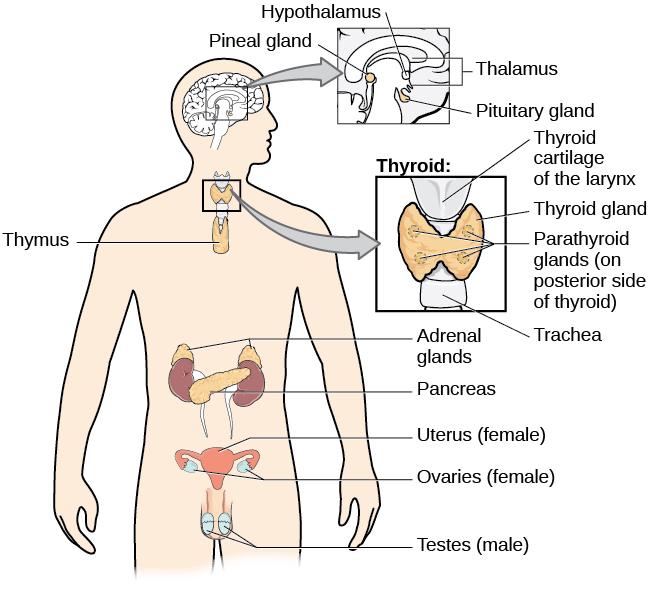| << Chapter < Page | Chapter >> Page > |
The endocrine system consists of a series of glands that produce chemical substances known as hormones ( [link] ). Like neurotransmitters, hormones are chemical messengers that must bind to a receptor in order to send their signal. However, unlike neurotransmitters, which are released in close proximity to cells with their receptors, hormones are secreted into the bloodstream and travel throughout the body, affecting any cells that contain receptors for them. Thus, whereas neurotransmitters’ effects are localized, the effects of hormones are widespread. Also, hormones are slower to take effect, and tend to be longer lasting.

Hormones are involved in regulating all sorts of bodily functions, and they are ultimately controlled through interactions between the hypothalamus (in the central nervous system) and the pituitary gland (in the endocrine system). Imbalances in hormones are related to a number of disorders. This section explores some of the major glands that make up the endocrine system and the hormones secreted by these glands.
The pituitary gland descends from the hypothalamus at the base of the brain, and acts in close association with it. The pituitary is often referred to as the “master gland” because its messenger hormones control all the other glands in the endocrine system, although it mostly carries out instructions from the hypothalamus. In addition to messenger hormones, the pituitary also secretes growth hormone, endorphins for pain relief, and a number of key hormones that regulate fluid levels in the body.
Located in the neck, the thyroid gland releases hormones that regulate growth, metabolism, and appetite. In hyperthyroidism, or Grave’s disease, the thyroid secretes too much of the hormone thyroxine, causing agitation, bulging eyes, and weight loss. In hypothyroidism, reduced hormone levels cause sufferers to experience tiredness, and they often complain of feeling cold. Fortunately, thyroid disorders are often treatable with medications that help reestablish a balance in the hormones secreted by the thyroid.
The adrenal glands sit atop our kidneys and secrete hormones involved in the stress response, such as epinephrine (adrenaline) and norepinephrine (noradrenaline). The pancreas is an internal organ that secretes hormones that regulate blood sugar levels: insulin and glucagon. These pancreatic hormones are essential for maintaining stable levels of blood sugar throughout the day by lowering blood glucose levels (insulin) or raising them (glucagon). People who suffer from diabetes do not produce enough insulin; therefore, they must take medications that stimulate or replace insulin production, and they must closely control the amount of sugars and carbohydrates they consume.
The gonads secrete sexual hormones, which are important in reproduction, and mediate both sexual motivation and behavior. The female gonads are the ovaries; the male gonads are the testis. Ovaries secrete estrogens and progesterone, and the testes secrete androgens, such as testosterone.
Although it is against most laws to do so, many professional athletes and body builders use anabolic steroid drugs to improve their athletic performance and physique. Anabolic steroid drugs mimic the effects of the body’s own steroid hormones, like testosterone and its derivatives. These drugs have the potential to provide a competitive edge by increasing muscle mass, strength, and endurance, although not all users may experience these results. Moreover, use of performance-enhancing drugs (PEDs) does not come without risks. Anabolic steroid use has been linked with a wide variety of potentially negative outcomes, ranging in severity from largely cosmetic (acne) to life threatening (heart attack). Furthermore, use of these substances can result in profound changes in mood and can increase aggressive behavior (National Institute on Drug Abuse, 2001).
Baseball player Alex Rodriguez (A-Rod) has been at the center of a media storm regarding his use of illegal PEDs. Rodriguez’s performance on the field was unparalleled while using the drugs; his success played a large role in negotiating a contract that made him the highest paid player in professional baseball. Although Rodriguez maintains that he has not used PEDs for the several years, he received a substantial suspension in 2013 that, if upheld, will cost him more than 20 million dollars in earnings (Gaines, 2013). What are your thoughts on athletes and doping? Why or why not should the use of PEDs be banned? What advice would you give an athlete who was considering using PEDs?
The glands of the endocrine system secrete hormones to regulate normal body functions. The hypothalamus serves as the interface between the nervous system and the endocrine system, and it controls the secretions of the pituitary. The pituitary serves as the master gland, controlling the secretions of all other glands. The thyroid secretes thyroxine, which is important for basic metabolic processes and growth; the adrenal glands secrete hormones involved in the stress response; the pancreas secretes hormones that regulate blood sugar levels; and the ovaries and testes produce sex hormones that regulate sexual motivation and behavior.
Given the negative health consequences associated with the use of anabolic steroids, what kinds of considerations might be involved in a person’s decision to use them?

Notification Switch
Would you like to follow the 'Psychology' conversation and receive update notifications?